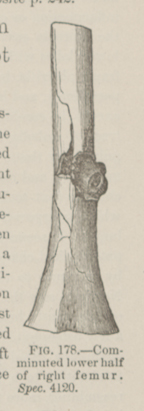Title: Bidlingmaier, J.
Source text: The Medical and Surgical History of the War of the Rebellion. (1861-65.), Part 3, Volume 2 (Washington, DC: Government Printing Office, 1883), 225.
Civil War Washington ID: med.d2e10788
TEI/XML: med.d2e10788.xml
CASE 438.—Corporal J. Bidlingmaier, Co. H, 73d New York, aged 46 years, was wounded before Petersburg, September 11, 1864. Surgeon O. Everts, 20th Indiana, noted his admission to the field hospital of the 3d division, Second Corps, with "shot fracture of thigh, followed by amputation." From the field the wounded man was transferred to the depot hospital at City Point, and thence, on October 8th, to Washington. Assistant Surgeon J. C. McKee, U. S. A., reported his entrance into Lincoln Hospital, with "antero-posterior flap amputation of the right thigh at the middle third," also that he was furloughed December 9th. The patient subsequently entered Judiciary Square Hospital, and on May 6, 1865, he was discharged from service, having been previously supplied with an artificial limb by the Jewett Patent Leg Co., of Washington, D. C. He was a pensioner until June 16, 1871, when he died of marasmus, his attending physician certifying that "it was evident that some portion of the splintered bone remained in the stump, as abscesses frequently formed thereon and copious discharges ensued;" also that the disease, as a consequence, first became apparent about the first of April, 1871. The amputated portion of the femur, represented in the wood-cut (FIG. 178), was contributed by Surgeon D. S. Hays, 110th Pennsylvania, who performed the operation. The specimen shows that the shaft was badly comminuted by a conoidal ball, which flattened, in a mushroom shape, against the anterior surface in the lowest third.
